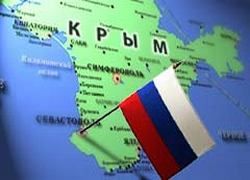
Crimeans who supported becoming a part of Russia expected that Russia would improve their living standards. But Crimea’s future does not look very optimistic. Despite all the efforts of Russian authorities, Crimea will be isolated for many years.
Crimeans who supported becoming a part of Russia expected that Russia would improve their living standards. But Crimea’s future does not look very optimistic. Despite all the efforts of Russian authorities, Crimea will be isolated for many years.
To understand Crimea’s unenviable economic prospects we ought to consider the example of “independent” Abkhazia, a former autonomous republic of Georgia. Once, like Crimea, it was a favorite resort destination for the inhabitants of the USSR.
The Russian-Georgian war resulted in the separation of the South Ossetia from Georgia. After the war, in the first half of August 2008, Abkhazia followed the lead of South Ossetia and appealed to Russia to recognize its independence from Georgia. On August 26, 2008 the then Russian President, Dmitry Medvedev, signed a decree recognizing Abkhazia’s independence. Residents of Abkhazia greeted the news with joy.
Since that time Russia has provided Abkhazia with financial assistance and support but the assistance often does not reach local residents. The independent republic is repeatedly shaken by corruption scandals: The so-called elite, which controls the political system of Abkhazia and is devoted to Russian government, simply embezzles the funds allocated by Russia. Houses are still destroyed by the Russian-Georgian war; there are so few jobs that people go to Russia to work; roads are still pot-holed, etc. Tourism, which was previously the main source of income for the region, is floundering: The few tourists in Abkhazia these days are mostly Russians nostalgic for Soviet-era resorts.
Now it seems likely that Crimea’s future will be similar to Abkhazia’s present.
 Crimea is a subsidized region. The peninsula only produces one-tenth of what it consumes. Ninety percent of its water, 80% of its electricity, and roughly 65% of its gas come from the rest of Ukraine. And while Russia has enough energy to supply power to Crimea, it’s lacking the infrastructure: There are no underwater cables through the Strait of Kerch, which separates Russia and Crimea. Before the Russian annexation of Crimea, Ukraine was financing around 70% of Crimea’s annual budget. Given the severing of economic ties with Ukraine, Crimea now needs much more aid. Only Russia will provide such aid.
Crimea is a subsidized region. The peninsula only produces one-tenth of what it consumes. Ninety percent of its water, 80% of its electricity, and roughly 65% of its gas come from the rest of Ukraine. And while Russia has enough energy to supply power to Crimea, it’s lacking the infrastructure: There are no underwater cables through the Strait of Kerch, which separates Russia and Crimea. Before the Russian annexation of Crimea, Ukraine was financing around 70% of Crimea’s annual budget. Given the severing of economic ties with Ukraine, Crimea now needs much more aid. Only Russia will provide such aid.
Russia has already pledged to inject up to 48 billion dollars in Crimea within the next decade. These funds will be for the construction of a five km bridge to unite the peninsula with Russia, the construction of the new roads, and the upgrading of airports. But nobody can guarantee that Russia will be able to implement these commitments, since the Russian economy is sliding into recession. As a result of the sanctions, both Crimea and Russia itself will become increasingly isolated from the rest of the world.
For the Crimeans whose income depends on tourism, the most noticeable change will be the lack of tourists this season. Many expected visitors have cancelled their tours because of the ongoing war in the southeast of Ukraine. The share of foreign tourists in Crimea was only 20% in previous years; the other 80% were Ukrainians, who are now choosing other resorts. The Crimeans beaches are empty. Soon, the Crimeans who have lost the income from tourism will have to go to Russia in search of work, as Abkhazians do today.
Food prices in Crimea are rising because the new border controls between Crimea and Ukraine limit the food supply in the peninsula. Previously, Ukraine supplied most of the food in Crimea’s supermarkets. Now Russia, citing violation of various regulations, is prohibiting deliveries from Ukraine. It is anticipated that prices will increase by 25% to 50%. And, while Russia has increased the income of retirees in Crimea by 50% and will increase the salaries of civil servants, the gain in disposable income will be imperceptible due to the increase in food prices.
The Abkhazian future of Crimea is the result of irresponsible policies of the Kremlin, which has moved from nostalgia for the Soviet era to the open annexation of territories in neighboring states.The Soviet-era health resorts in Crimea, which have fallen into disrepair in last 20 years, have been taken into possession by the Russian state-owned companies and oligarchs close to the Kremlin. The famous royal palace, the health resort of Pharos, where the last Soviet president Mikhail Gorbachev was blocked while vacationing in 1991 during the coup, will probably be taken up by Putin’s administration. It is possible Putin will even have time to live there and enjoy the Crimean coast. It is not clear though if the economy and the inhabitants of the Crimea will benefit from this.





